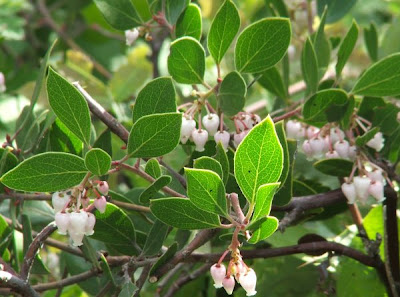Every summer, it seems, there is again speculation that some Ivory-billed woodpeckers, thought to be extinct, were sighted. I'm always completely drawn in. Wouldn't it be wonderful? Just once, some good news. A surprise. But the problem is that they're fast, and shy, and easy to confuse with other birds. So, so far, we just don't know.
Now imagine that there's a beautiful plant thought to be extinct in the wild. A few species remain in botanical gardens. Another sad story of humans encroaching on the natural world, and something precious lost. Except this story has a happy ending!
(Above image taken from this page on the Las Pilitas Nursery site.) Late in 2009, a single Arctostaphylos franciscana (Franciscan manzanita) was found in the middle of a traffic island near the Golden Gate Bridge. Contractors had demolished all surrounding "shrubbery" but left this plant to avoid blowing wood chips in the direction of a CHP officer. Daniel Gluesenkamp, a partner in Bay Area Early Detection Network was looking for invasives and noticed the plant while driving by. Experts were called and the plant was identified.
A rare collaboration between a number of different agencies resulted and the plant was removed from its precarious location and replanted at an undisclosed location in the Presidio. The spring 2010 newsletter of the California Native Plant society has the story in great detail, and it's quite spell binding. Just look at the size of plant and rootball, and imagine how much fun the boys must have had with their machinery. But no matter, in the early morning in January 2010, the plant found its new home. Cuttings and seeds were taken in the hope that additional plants can be grown.
Of course, there was the usual talk about how expensive the move was, the terrible wast of money. But I'm with the writer of the CNPS article, who says "The Franciscan manzanita experience teaches us that people of good will can find a way to work together and make magic happen when they are open for each other's perception of a problem and are motivated to share their particular extertise in order to solve it. There is a reverence for life deep within all of us. No one truly wants a species to be extinct. We need to continue to search for opportunities to bring back nature while engaging a broader segment of our society in this mission. "
(For more information, see this article in Bay Nature magazine, become a CNPS member or borrow the CNPS newsletter from a friend.)



Comments
I remember when a CA native was rediscovered in Mount Diablo...was it a buckwheat? The cool thing was that an amateur botanist found it! :)
I have a birding buddy that has seen the Ivory Bill! Small small world.
nellie